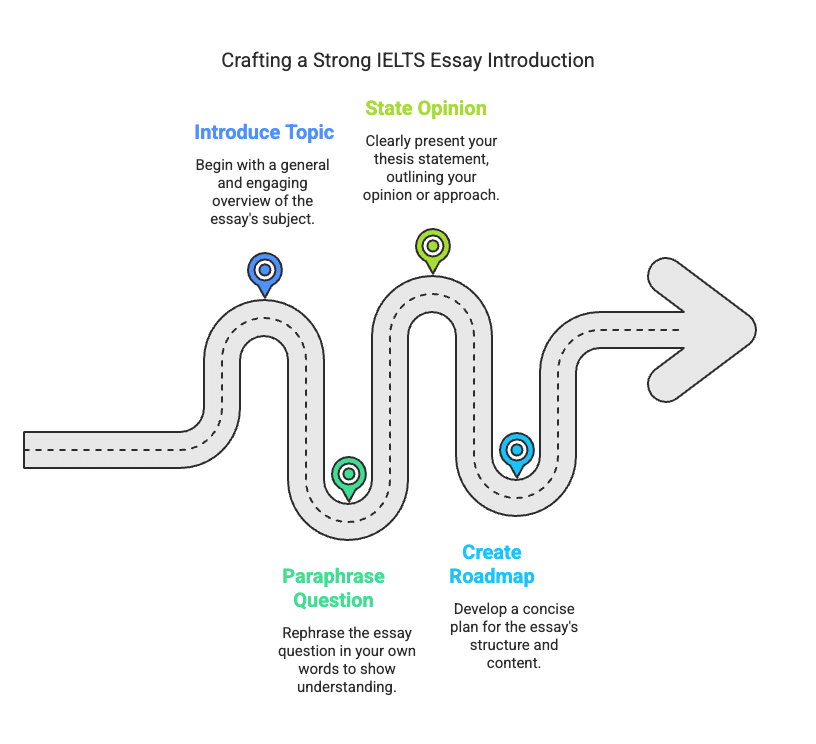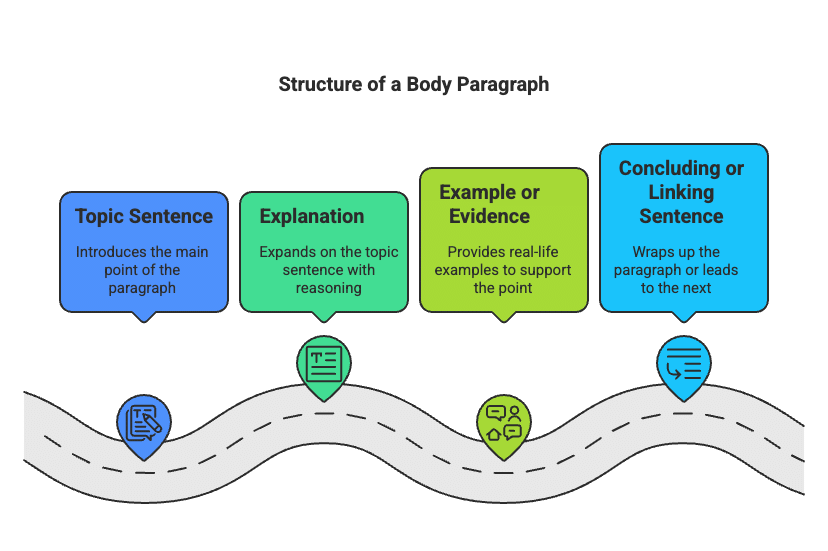How to Write a Band 7+ Essay for IELTS Writing Task 2 | Writing for Academic IELTS PDF Download
| Table of contents |

|
| 1. Introduction |

|
| 2. Body Paragraphs |

|
| 3. Conclusion |

|
| Common Mistakes to Avoid in IELTS Essay Writing |

|
Writing a strong essay in IELTS Writing Task 2 is essential for achieving a high band score. While your grammar, vocabulary, and coherence matter, so does your ability to structure the essay clearly. A well-organised essay typically includes four main parts: the introduction, body paragraphs (usually two), and the conclusion.
This guide will walk you through each part of an IELTS essay in detail to help you write more effectively and confidently.
1. Introduction
The introduction is one of the most important parts of your IELTS essay. It is your first opportunity to impress the examiner, and it sets the tone for the rest of your response. A strong introduction clearly tells the reader what your essay is about and shows that you have understood the task. An introduction should be approximately 40-50 words.
A well-written introduction should:
Paraphrase the essay question using your own words
Clearly state your opinion or approach (this is called the thesis statement)
Avoid diving into specific arguments or examples in the introduction—those should be reserved for your body paragraphs. Your goal here is to create a clear, concise roadmap for the rest of your essay.

Structure of the Introduction
To make your introduction effective, follow this 2-step formula:
a. Paraphrase the Question
Rewrite the essay prompt in your own words to show that you understand what is being asked. This also helps avoid plagiarism and repetition. You can do this by:
Changing the sentence structure
Using synonyms where appropriate
Keeping the meaning the same
Essay Prompt:
Some people believe that unpaid community service should be a compulsory part of high school programmes. Do you agree or disagree?
Paraphrased Version:
Many argue that students in secondary school should be required to participate in voluntary community work as a part of their education.
b. Thesis Statement
Next, state your position or outline what your essay will discuss. This is the most important part of your introduction, as it tells the examiner exactly where you stand.
There are different ways to write your thesis depending on the question type:
For opinion essays, state whether you agree or disagree
For discussion essays, mention both views and your own
For problem-solution essays, identify the issue and suggest you will propose a solution
Example (opinion):
In my opinion, incorporating unpaid community service into the school curriculum can offer valuable learning experiences and promote social responsibility among students.
Complete Sample Introduction:
Essay Question: Some people believe that unpaid community service should be a compulsory part of high school programmes. Do you agree or disagree?
Introduction:
There is growing interest in the idea of making community service a mandatory component of high school education. While this approach has received some criticism, I believe that involving students in unpaid volunteer work not only benefits society but also helps young people develop important life skills and values.
2. Body Paragraphs
The body paragraphs form the core of your IELTS essay. This is where you present and develop your main arguments or ideas in response to the essay prompt. While most essays include two main body paragraphs, you may use a third if you have time and a well-organised structure. However, quality and clarity are far more important than quantity. Each paragraph should be 90-120 words.
Each body paragraph should:
Focus on one clear main idea
Begin with a topic sentence to introduce that idea
Include explanations, examples, and evidence to support your argument
Be logically organised and connect smoothly to other parts of the essay
Structure of a Body Paragraph
To build a coherent and well-developed paragraph, follow this simple structure:
a. Topic Sentence
This is the first sentence of the paragraph and clearly states the point you will discuss. It acts as a mini-introduction to the paragraph and should relate directly to your thesis.
Example:
One major benefit of mandatory community service is that it encourages students to develop empathy and social awareness.
b. Explanation
This is where you expand on your topic sentence. Explain how or why the idea supports your argument, and provide logical reasoning.
Example:
When students engage in volunteering activities, they begin to understand the challenges faced by others and become more sensitive to the needs of their communities.
c. Example or Evidence
Use a real-life example, data, or personal experience to illustrate your point. This strengthens your argument and shows the examiner you can apply your ideas.
Example:
For instance, students who help at local shelters or food banks often report a deeper appreciation for the importance of social responsibility and cooperation.
d. Concluding or Linking Sentence (optional)
This sentence can either wrap up the idea or lead into the next paragraph, maintaining the flow of the essay.
Example:
As a result, community service helps build not only stronger individuals but also more compassionate societies.
Example (Body Paragraph 1):
One major benefit of mandatory community service is that it encourages students to develop empathy and social responsibility. By helping others in need, young people become more aware of societal issues and are likely to grow into more caring citizens. For example, volunteering at a local food bank can make students appreciate the importance of giving back to their communities.

3. Conclusion
The conclusion is the final paragraph of your essay and serves to summarise your main ideas and reinforce your position. A well-written conclusion gives your essay a strong, confident ending and leaves a positive impression on the examiner. A conclusion should typically be 30-40 words.
This paragraph should:
Restate your position or key arguments clearly and concisely
Avoid introducing any new information, examples, or points
Optionally include a final thought, implication, or recommendation
Remember, the goal is to reaffirm what you’ve already said, not to add more details.
Structure of the Conclusion
Summary of your opinion or main points
Rephrase your thesis or recap the key ideas from the body paragraphs.(Optional) Final thought or recommendation
You may include a forward-looking statement, suggestion, or reflection.
Example:
In conclusion, making community service a compulsory part of school education would instil strong moral values in students and benefit society as a whole. Therefore, I believe such a policy should be encouraged in educational institutions.
Tips for a Strong Conclusion
Use clear linking phrases such as “In conclusion”, “To summarise”, or “Overall” to signal the end of your essay.
Make sure your final sentence reinforces your position.
Keep it brief and avoid repeating sentences word-for-word from earlier paragraphs.
Ensure consistency between your introduction, body, and conclusion.
Common Mistakes to Avoid in IELTS Essay Writing
Avoiding common errors can significantly improve your score in the IELTS Writing Task 2. Here are some mistakes to watch out for:
Not addressing all parts of the question
Make sure you answer every aspect of the task—missing a part can lower your Task Response score.Lack of a clear opinion or position
In opinion and argument essays, clearly state your viewpoint in the introduction and maintain it throughout.Poor structure or organisation
Avoid writing long paragraphs or mixing multiple ideas in one paragraph. Use clear paragraphing: Introduction, Body Paragraphs, Conclusion.Overusing simple or repetitive vocabulary
Show a range of vocabulary and avoid repeating the same words. Use synonyms and topic-specific terms where appropriate.Grammatical errors and limited sentence variety
Repeating only simple sentence structures or making frequent grammar mistakes can hurt your Grammatical Range and Accuracy score.No linking words or poor cohesion
Use transition words like however, therefore, for example, and in contrast to link ideas clearly.Going off-topic or adding new ideas in the conclusion
Stay focused on the question and do not introduce new points in your conclusion.Writing fewer than 250 words
Always write at least 250 words; otherwise, you will lose marks.
|
30 videos|206 docs|17 tests
|
FAQs on How to Write a Band 7+ Essay for IELTS Writing Task 2 - Writing for Academic IELTS
| 1. What are common mistakes to avoid in IELTS essay writing? |  |
| 2. How can I achieve a Band 7 or higher in IELTS Writing Task 2? |  |
| 3. What is the ideal structure for an IELTS Writing Task 2 essay? |  |
| 4. How important is vocabulary in the IELTS essay? |  |
| 5. Should I write in formal or informal style in my IELTS essay? |  |















